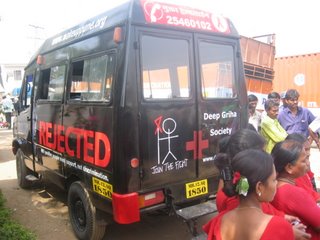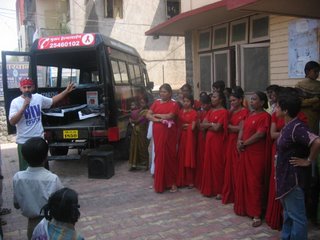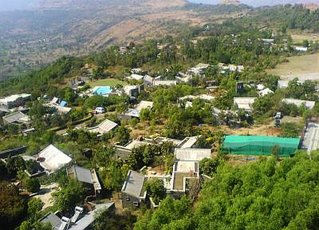Moving right along...
Speaking of the Nutrition Centre, it opened on Monday morning and will serve the HIV infected IV drug user community by providing them with nutritious meals and soon vocational training opportunities to help rehabilitate them and assist them in living their lives as healthy PLHIV. The ceremony itself was nice, and I can personally vouch that the food served here is especially tasty.
The signage outside the centre notes that it is for HIV infected persons, thus the status of those who visit the centre will be known by passers-by. I would say that I am not sure how I feel about this, whether or not their status should remain in their own confidence, or if it should be common knowledge. If stigma didn't exist then their status being common knowledge wouldn't matter, but we are a long way from stigma regarding HIV disappearing.
Our new ad campaign for Wake-Up Pune will specifically address stigma as its main focus, and coupled with the bold "REJECTED" that is emblazoned upon the flank of the DMAV it will be direct. Will people listen? The new add campaign will be bold and "in your face", I think they will listen, the difficult bit is whether or not they will apply it. We need to reach everyone. How do we do this? We have awareness sessions in communities, in schools, in businesses; we have posters; we have concerts; we have marches; we have vigils (May 20th-MG Road); we hopefully soon will have stigma chakra statues made by local student artists able to be moved around Pune. Once we reach everyone, what more can we do? It is up to the individuals to apply it to their actions as "HIV positive" people free from stigma.
"we have sessions": The opening yesterday just kicked off the day for the DISHA crew. Spinning off the opening ceremony, the Goltekadi community was the staging area for two more awareness events. I'm beginning to feel like a groupie on tour with a rock band. We were separated from the DMAV for the first time in a while and that absence was noticed as it crimped our capacity for not only volume and visibility, but most importantly for the semi-privacy that it affords our condom demonstrations. While we should have used it for the first session, given to a mixed gender and age crowd of about 100, the second session's geographical setting within the community prohibited the entrance of the DMAV. Both sessions featured more women than we usually get, the second was probably the most women I've ever seen at an event, which was great. To combat repetition, the team employs several different presentations to rotate and keep themselves fresh and the information sharply delivered. In the second session Meera really stole the show, not that this is new, but I think a forthcoming blog will present a retrospective on her acting talents and her ability to really engage the audience in both a humorous and serious way. Although I don't speak Marathi and only know the general outline of what is said in the presentations, I feel like they are well presented and efficient, I always leave feeling good about the potential outcome, and at least the fact that it will spark conversations about the material within the community for days to come.
More to come this week: Wake-up Pune meetings; all day training session for students on HIV awareness; interviews with young people about ways they gain their information about sex (especially important if sex-ed in Maharashtra keeps getting hamstrung); DMAV sessions in the city and in rural areas; the beginning of the ambitious cultural survey of the Tadiwala Rd. community; a multi-day conference in Lonavla on HIV and the Church.
Onward...













